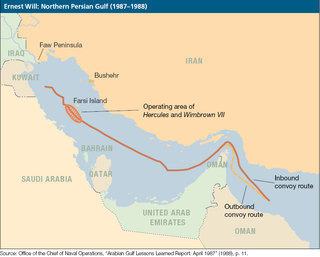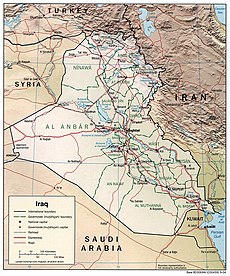
United Nations Security Council resolution 986, adopted unanimously on 14 April 1995, after reaffirming all resolutions on Iraq and noting the serious humanitarian situation with the Iraqi civilian population, the council, acting under Chapter VII of the United Nations Charter, established a mechanism whereby Iraqi oil exports would finance humanitarian aid to the country, which later became known as the Oil-for-Food Programme.

United Nations Security Council resolution 479, adopted unanimously on 28 September 1980, after reminding Member States against the use of threats and force in their international relations, the Council called upon Iran and Iraq to immediately cease any further uses of force and instead settle their dispute through negotiations.

United Nations Security Council resolution 514, adopted unanimously on 12 July 1982, after recalling Resolution 479 (1980) and noting the mediation efforts by the Secretary-General, Organisation of the Islamic Conference and the Non-Aligned Movement, the council expressed its deep concern at the prolonged conflict between Iran and Iraq.

United Nations Security Council resolution 522, adopted unanimously on 4 October 1982, after recalling Resolution 479 (1980) and Resolution 514 (1982), the council called for an immediate ceasefire between Iran and Iraq, calling for the withdrawal of both sides to their internationally recognised borders.

United Nations Security Council resolution 540, adopted on 31 October 1983, noting the report of the Secretary-General and the increased cooperation from the governments of Iran and Iraq, the Council requested he continue with the mediation efforts in the region.

United Nations Security Council resolution 552, adopted on 1 June 1984, after hearing complaints from Bahrain, Kuwait, Oman, Qatar, Saudi Arabia and the United Arab Emirates regarding attacks on their ships by Iran, the Council condemned the attacks, reiterating that Member States should refrain from using threats or use of force in their international relations.

United Nations Security Council resolution 582, adopted unanimously on 24 February 1986, after noting that the council had been seized for six years and the continued conflict between Iran and Iraq, the council deplored the initial acts that started the Iran–Iraq War and continuation of the conflict.

United Nations Security Council resolution 598 S/RES/0598 (1987), adopted unanimously on 20 July 1987, after recalling Resolution 582 and 588, called for an immediate ceasefire between Iran and Iraq and the repatriation of prisoners of war, and for both sides to withdraw to the international border. The resolution requested Secretary-General Javier Pérez de Cuéllar to dispatch a team of observers to monitor the ceasefire while a permanent settlement was reached to end the conflict.

United Nations Security Council Resolution 612 was adopted unanimously on 9 May 1988. After considering a report by the Special Mission that was dispatched by the Secretary-General to investigate the alleged chemical warfare that had been occurring in the Iran–Iraq War, the council confirmed the use of chemical weapons and issued a condemnation on the grounds that the usage of these weapons ran contrary to states' obligations under the Geneva Protocol.

United Nations Security Council resolution 616, adopted unanimously on 20 July 1988, after hearing representations from the Islamic Republic of Iran, the Council expressed its distress at the downing of Iran Air Flight 655 over the Strait of Hormuz by a missile from the United States Navy cruiser USS Vincennes during the conflict between Iran and Iraq.

United Nations Security Council resolution 619 was a resolution adopted unanimously on 9 August 1988 by the United Nations. The resolution came after recalling Resolution 598 (1987) and approving a report by the Secretary-General Javier Pérez de Cuéllar on the implementation of paragraph 2 of Resolution 598.

United Nations Security Council resolution 631, adopted unanimously on 8 February 1989, after recalling resolutions 598 (1987) and 618 (1988) and having considered a report by the Secretary-General Javier Pérez de Cuéllar on the United Nations Iran–Iraq Military Observer Group, the Council decided:

United Nations Security Council resolution 642, adopted unanimously on 29 September 1989, after recalling resolutions 598 (1987), 618 (1988) and 631 (1989) and having considered a report by the Secretary-General Javier Pérez de Cuéllar on the United Nations Iran–Iraq Military Observer Group, the Council decided:

United Nations Security Council resolution 651, adopted unanimously on 29 March 1990, after recalling resolutions 598 (1987), 619 (1988), 631 (1989) and 642 (1989), and having considered a report by the Secretary-General Javier Pérez de Cuéllar on the United Nations Iran–Iraq Military Observer Group, the Council decided:

United Nations Security Council resolution 671, adopted unanimously on 27 September 1990, after recalling resolutions 598 (1987), 619 (1988), 631 (1989), 642 (1989) and 651 (1990), and having considered a report by the Secretary-General Javier Pérez de Cuéllar on the United Nations Iran–Iraq Military Observer Group, the Council decided:

United Nations Security Council resolution 676, adopted unanimously on 28 November 1990, after recalling resolutions 598 (1987), 618 (1988), 631 (1989), 642 (1989), 651 (1990) and 671 (1990), and having considered a report by the Secretary-General Javier Pérez de Cuéllar on the United Nations Iran–Iraq Military Observer Group, the Council decided:

United Nations Security Council resolution 685, adopted unanimously on 31 January 1991, after recalling resolutions 598 (1987), 618 (1988), 631 (1989), 642 (1989), 651 (1990), 671 (1990) and 676 (1990), and having considered a report by the Secretary-General Javier Pérez de Cuéllar on the United Nations Iran–Iraq Military Observer Group, the Council decided:

United Nations Security Council resolution 700, adopted unanimously on 17 June 1991, after recalling resolutions 661 (1991), 665 (1991), 670 (1991) and 687 (1991), and noting the report by the Secretary-General it requested, the council, acting under Chapter VII, the Council approved the full implementation of Resolution 687–the arms embargo against Iraq.

United Nations Security Council resolution 715, adopted unanimously on 11 October 1991, after recalling resolutions 687 (1991) and 707 (1991), the council, acting under Chapter VII of the United Nations Charter, approved plans from the International Atomic Energy Agency (IAEA) and Secretary-General Javier Pérez de Cuéllar regarding the long-term monitoring of Iraq's weapons programme, requiring it to submit "on-going monitoring and verification" of the country's dual-use facilities.

United Nations Security Council resolution 1360, adopted unanimously on 3 July 2001, after recalling all previous resolutions on Iraq, including resolutions 986 (1995), 1284 (1999), 1330 (2000) and 1352 (2001) concerning the Oil-for-Food Programme, the Council extended provisions relating to the export of Iraqi petroleum or petroleum products in return for humanitarian aid for a further 150 days.










